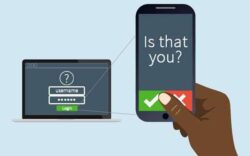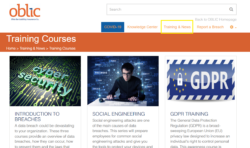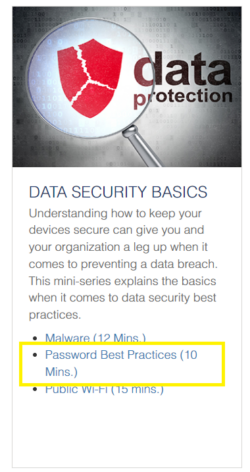In this week’s OBLIC Alert, we have a couple of practical tips that coincide with suggested administrative tasks in this Spring’s Malpractice Alert. Remember that the Cyber Toolbox available to OBLIC policyholders is full of useful resources to help prevent a cyber breach.
Multi-Factor Authentication or Two-Factor Authentication is an added layer of security that you can set up when logging into a website or application. “Multi-Factor Authentication” means that an additional action is required when logging in to a website or application to “authenticate” or prove that the person accessing the account is the true account holder. This additional action could be entering a text code sent to an email address associated with the account or accepting a push notification from a mobile device. For example, you might log in to your Google account from your desktop using your username and password, and then also receive a push notification to your mobile device to verify your access. With Multi-Factor Authentication in place, if your username and password are stolen, the attacker still would not be able to access your accounts because the hackers could not verify the log in. When using Multi-Factor Authentication, remember to only verify the log in when you are accessing your account.

Password Management broadly refers to principles and practices in creating, managing, and storing user login credentials such as user IDs and passwords. Services and applications are available to assist with password creation and storage, such as Google Password Manager, LastPass, Bitwarden, and Dashlane. Password management services are digital, encrypted vaults that secure and store passwords and other sensitive data for your web-based accounts. OBLIC does not recommend a particular application or service, so please do your research when selecting a password management service.
According to cyber security experts, the best passwords are long, unique, and changed regularly. This means that your passwords are going to be harder to remember, and also harder to hack. Although there have been data breaches with some password management applications, use of these types of applications is still recommended by cybersecurity experts.
Available through the OBLIC Cyber Toolbox is a 10-minute training course on Password Best Practices. This training includes additional information on Password Managers and Multi-Factor Authentication. You or your staff can access this training video at any time by logging in to the Cyber Toolbox and selecting the “Training & News” tab.

Then scroll down to the “Data Security Basics” tile and select “Password Best Practices” for the training video.

OBLIC takes pride in delivering relevant and timely information to our insured attorneys. Please remember our complimentary loss prevention hotline – a resource for policyholders to access helpful recommendations, ethics consults and sample forms. We’re here to help resolve your questions and be of service to you!
| Gretchen K. Mote, Esq. Director of Loss Prevention Ohio Bar Liability Insurance Co. Direct: 614.572.0620 [email protected] |
Merisa K. Bowers, Esq. Loss Prevention Counsel Ohio Bar Liability Insurance Co. Direct: 614.859.2978 [email protected] |


